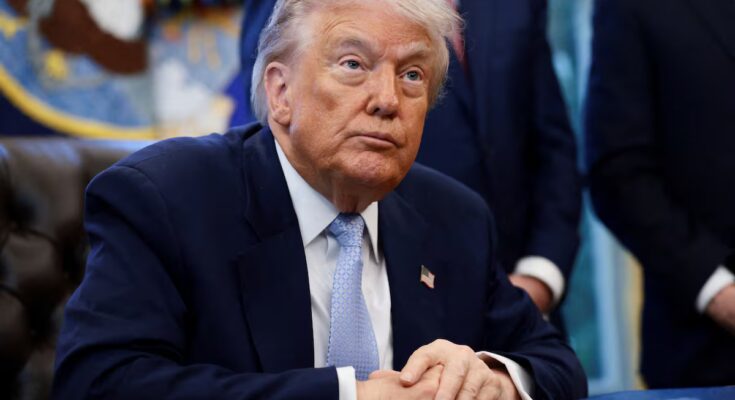On Wednesday, Donald Trump signed a bill ordering the Justice Department to release files on millionaire financier and convicted sex offender Jeffrey Epstein. Or, at least, that’s what he said he did, 24 hours after the bill was overwhelmingly approved by both the House and Senate. The president of the United States chose to sign it without witnesses and without the usual ceremony he prefers in these cases. The announcement was made on his social platform, Truth Social, after 9pm, at the end of a day in which, unusually for him, he avoided the press.
In his message, Trump said little about the law, his former friend’s crimes or the victims. Instead, he took the opportunity to recall that Epstein was arrested and died in a maximum-security cell in Manhattan (the medical examiner ruled it a suicide) under his first presidency; also said that Epstein was “a lifelong Democrat”; and he takes credit for the passage of the bill, because last Sunday he gave his people permission to support it in both Houses.
“Democrats have used the Epstein issue, which concerns them much more than the Republican Party, to try to distract from our AMAZING victories,” he wrote on Truth Social, before listing all these accomplishments with a mix of exaggerations, lies and half-truths.
In his message, Trump cited former President Bill Clinton, former Treasury Secretary Larry Summers, who was removed or resigned from several boards following revelations about his email exchanges with the late financier; Democratic donor Reid Hoffman; House Minority Leader Hakeem Jeffries, who Trump accused of asking Epstein for campaign donations after he was indicted, and Democratic Rep. Stacey Plaskett, another figure who has been exposed by recent emails.
The announcement ends months in which Trump repeatedly refused to authorize the release of Epstein’s files in the hope that a storm that had raged particularly strongly among his MAGA supporters would die down on its own. The signing also starts the clock ticking for the Justice Department, which has 30 days to release all investigative files relating to Epstein’s crimes and connections that may be revealed within his circle of rich and powerful friends.
The disclosure material is a vast and comprehensive collection of files comprising millions of pages, including flight logs, personal communications, internal reports, metadata, immunity agreements, funder employee contracts, and emails.
Exceptions to Disclosure
But the legislation includes exceptions that allow the Justice Department to withhold some information, a fact that could turn this new declassification into another chapter in the story of accumulated disappointment for those who want to clarify once and for all how far Epstein’s sex trafficking ring went and who participated in it.
The law requires that released material be easily accessible and downloadable. But it authorizes the Justice Department to redact information that could compromise victims, material containing descriptions of child sexual abuse, graphic images or information that could jeopardize an ongoing investigation. Bondi is required to justify such censorship, and Congress is required to issue a supplemental report detailing the redacted content within 15 days of publication.
Victims, who gathered at the Capitol on Tuesday to watch the passage of the new law, said they feared the Trump administration would release excessively redacted material or seize on the existence of these ongoing investigations to avoid releasing documents.
Washington veterans remember another declassification: the President John F. Kennedy Assassination Records Collection Act of 1992. Congress then ordered the gradual release of documents related to the Kennedy assassination and established similar protocols for handling classified information. Many of these documents were released, although subsequent administrations invoked national security exemptions to delay their full disclosure. In 2017, Trump ordered the release of thousands of documents about JFK and added more this year, but even now, more than 30 years later, there are still materials waiting to see the light.
Sign up to our weekly newsletter to get more English-language news coverage from EL PAÍS USA Edition



